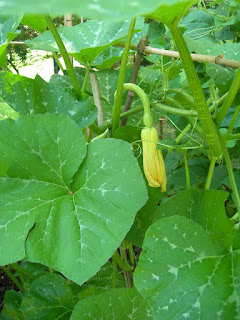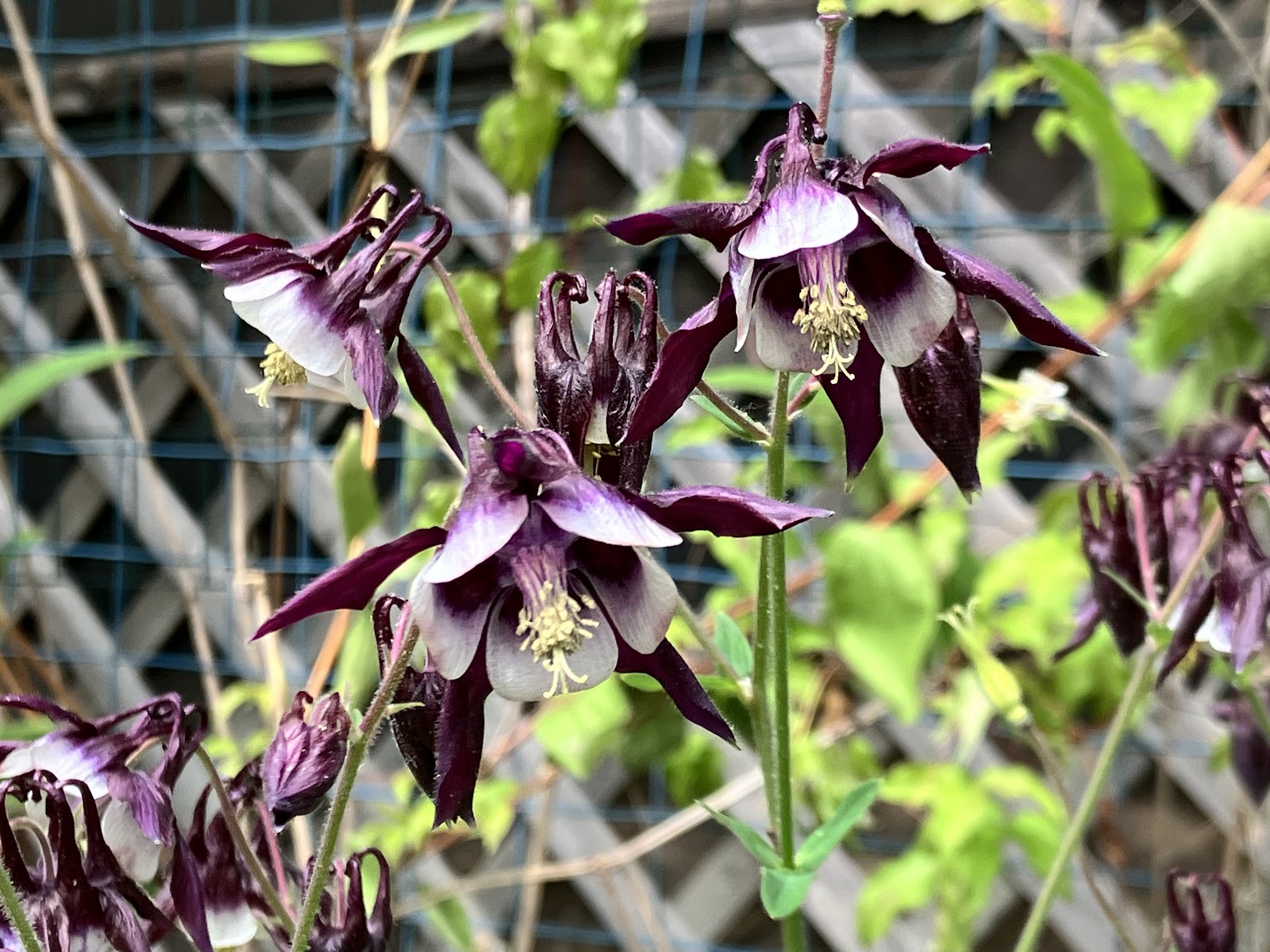The Wisdom Of IPM
I have been working on a new Master Gardener talk on how to increase productivity of one's vegetable garden.
In the first part of the presentation, we examine different designs of planting beds and their relative efficiency in space utilization. It is important for people who live in urban areas to squeeze out every single bit of garden space they can have in their tiny plot.
Later in the presentation, I share with the audience something interesting I learnt from being a Master Gardener: it actually increases the productivity if you grow flowers in your vegetable garden. Here is how it works.
When you grow pollinator-friendly flowering plants in your garden, you attract beneficial creatures to your garden. The large, colorful flowers definitely catch the attention of pollinators better than those of vegetables. When pollinators come for a visit, they will eat from all flowers including those of your veggies and get them pollinated.
The mistake that many urban farmers make is that they use every inch of garden space to grow only crop plants. To them, growing any other plant is a waste of space. Productivity is everything! However, their eagerness to get more end up giving them a lower yield because of poor pollination!
Growing flowers has more benefits: Many birds and predatory insects also enjoy nectar. They serve as your volunteer garden patrol and help eat bad bugs up for extra protein. These visitors keep your plants healthier and, thus, more productive.
Some people do not believe in the power of nature. The moment they see harmful insects, as a reflex, they pull out the big gun -- insecticide sprays. "WHAT? It's ORGANIC!" Some people drank the organic Koolaid and believe that anything "organic" is natural and it has to be good.
"Organic" is only a term to describe the source of a chemical. Yes, a CHEMICAL. Even when it is organic, it is a chemical! Everything you applied to the garden is a chemical. Organic chemicals can be just as harmful as, if not more deadly than, a synthetic one. Incorrect application of organic chemicals -- insecticides or fertilizers -- can be an environmental disaster, too. The question is not really about whether what you use is organic or not. It is more a matter of whether you are using the right things at the right time in the right way. But, many people do not understand and, so, do not think this way.
When an impatient gardener pulls out the insecticide at the sight of a single bad bug, he jumps starts a chain reaction that takes the ecosystem down the drain. More likely than not, the insecticide kills more than the targeted bug. Even the good bugs are killed. For a moment, it seems like the problem is solved. The bad guy is gone, no? Before long, the lowered good-bug-population brings about an unexpected surge in bad bugs. There are not enough natural enemies to keep them in check. The damage from the second wave of bad bug attack ends up being way worse than the first one. Had he waited a little to give nature a chance to do its job, even though there might be a little bit of damage at first, everything will be back to balance when the good bugs move in. Repeated aggressive applications of chemicals throw the balance of nature off and lead the ecosystem into a downward spiral.
The ancient philosopher Zhuang Zi talks about the concept of "the usefulness of uselessness". I think the planting of flowers by vegetable beds is a very good example of the concept. It involves being able to see the subject matter from more than one perspective. It has been 2,240 years since the passing the great sage. It seems like we have yet to acquire the wisdom he tried to share with us.
In the first part of the presentation, we examine different designs of planting beds and their relative efficiency in space utilization. It is important for people who live in urban areas to squeeze out every single bit of garden space they can have in their tiny plot.
Later in the presentation, I share with the audience something interesting I learnt from being a Master Gardener: it actually increases the productivity if you grow flowers in your vegetable garden. Here is how it works.
When you grow pollinator-friendly flowering plants in your garden, you attract beneficial creatures to your garden. The large, colorful flowers definitely catch the attention of pollinators better than those of vegetables. When pollinators come for a visit, they will eat from all flowers including those of your veggies and get them pollinated.
The mistake that many urban farmers make is that they use every inch of garden space to grow only crop plants. To them, growing any other plant is a waste of space. Productivity is everything! However, their eagerness to get more end up giving them a lower yield because of poor pollination!
Growing flowers has more benefits: Many birds and predatory insects also enjoy nectar. They serve as your volunteer garden patrol and help eat bad bugs up for extra protein. These visitors keep your plants healthier and, thus, more productive.
Some people do not believe in the power of nature. The moment they see harmful insects, as a reflex, they pull out the big gun -- insecticide sprays. "WHAT? It's ORGANIC!" Some people drank the organic Koolaid and believe that anything "organic" is natural and it has to be good.
"Organic" is only a term to describe the source of a chemical. Yes, a CHEMICAL. Even when it is organic, it is a chemical! Everything you applied to the garden is a chemical. Organic chemicals can be just as harmful as, if not more deadly than, a synthetic one. Incorrect application of organic chemicals -- insecticides or fertilizers -- can be an environmental disaster, too. The question is not really about whether what you use is organic or not. It is more a matter of whether you are using the right things at the right time in the right way. But, many people do not understand and, so, do not think this way.
When an impatient gardener pulls out the insecticide at the sight of a single bad bug, he jumps starts a chain reaction that takes the ecosystem down the drain. More likely than not, the insecticide kills more than the targeted bug. Even the good bugs are killed. For a moment, it seems like the problem is solved. The bad guy is gone, no? Before long, the lowered good-bug-population brings about an unexpected surge in bad bugs. There are not enough natural enemies to keep them in check. The damage from the second wave of bad bug attack ends up being way worse than the first one. Had he waited a little to give nature a chance to do its job, even though there might be a little bit of damage at first, everything will be back to balance when the good bugs move in. Repeated aggressive applications of chemicals throw the balance of nature off and lead the ecosystem into a downward spiral.
The ancient philosopher Zhuang Zi talks about the concept of "the usefulness of uselessness". I think the planting of flowers by vegetable beds is a very good example of the concept. It involves being able to see the subject matter from more than one perspective. It has been 2,240 years since the passing the great sage. It seems like we have yet to acquire the wisdom he tried to share with us.



Comments
Post a Comment